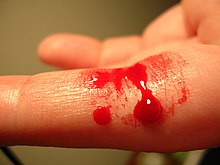This article about biology may be excessively human-centric. |
| Bleeding | |
|---|---|
| Other names | Hemorrhaging, haemorrhaging, blood loss |
 | |
| A bleeding wound in the finger | |
| Specialty | Emergency medicine, hematology |
| Complications | Exsanguination, hypovolemic shock, coma, shock |
Bleeding, hemorrhage, haemorrhage or blood loss is blood escaping from the circulatory system from damaged blood vessels.[1] Bleeding can occur internally, or externally either through a natural opening such as the mouth, nose, ear, urethra, vagina or anus, or through a puncture in the skin. Hypovolemia is a massive decrease in blood volume, and death by excessive loss of blood is referred to as exsanguination.[2] Typically, a healthy person can endure a loss of 10–15% of the total blood volume without serious medical difficulties (by comparison, blood donation typically takes 8–10% of the donor's blood volume).[3] The stopping or controlling of bleeding is called hemostasis and is an important part of both first aid and surgery.
- ^ Roth, Elliot J. (2011). "Hemorrhage". Encyclopedia of Clinical Neuropsychology. Springer. pp. 1234–5. doi:10.1007/978-0-387-79948-3_2178. ISBN 978-0-387-79947-6.
Hemorrhage is active bleeding, in which blood escapes from the blood vessels, either into the internal organs and tissues or outside of the body.
- ^ "Dictionary Definitions of Exsanguination". Reference.com. Archived from the original on 2007-07-11. Retrieved 2007-06-18.
- ^ "Blood Donation Information". UK National Blood Service. Archived from the original on 2007-09-28. Retrieved 2007-06-18.